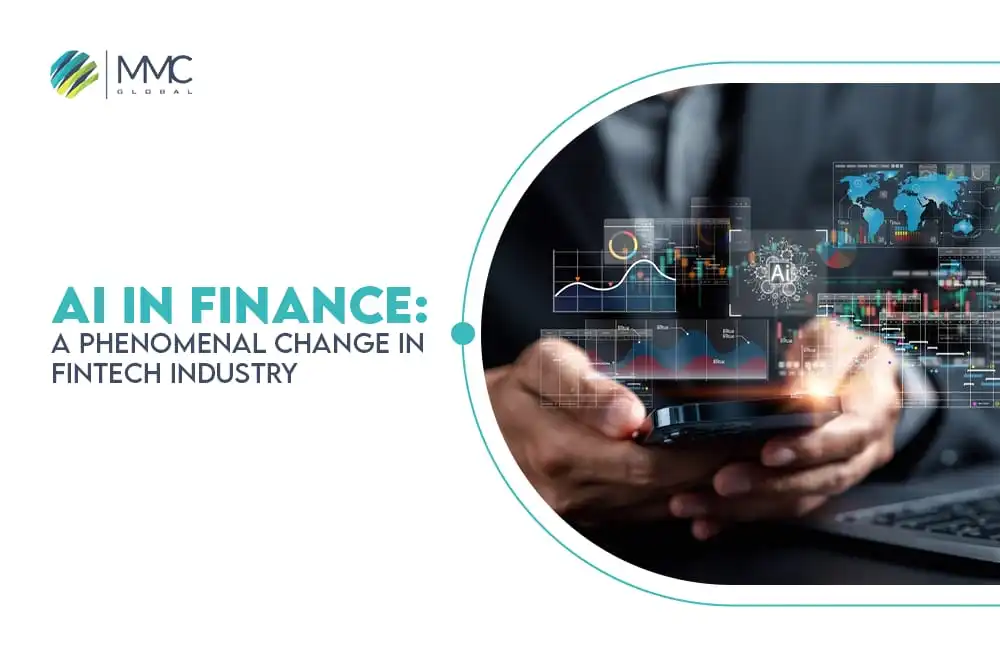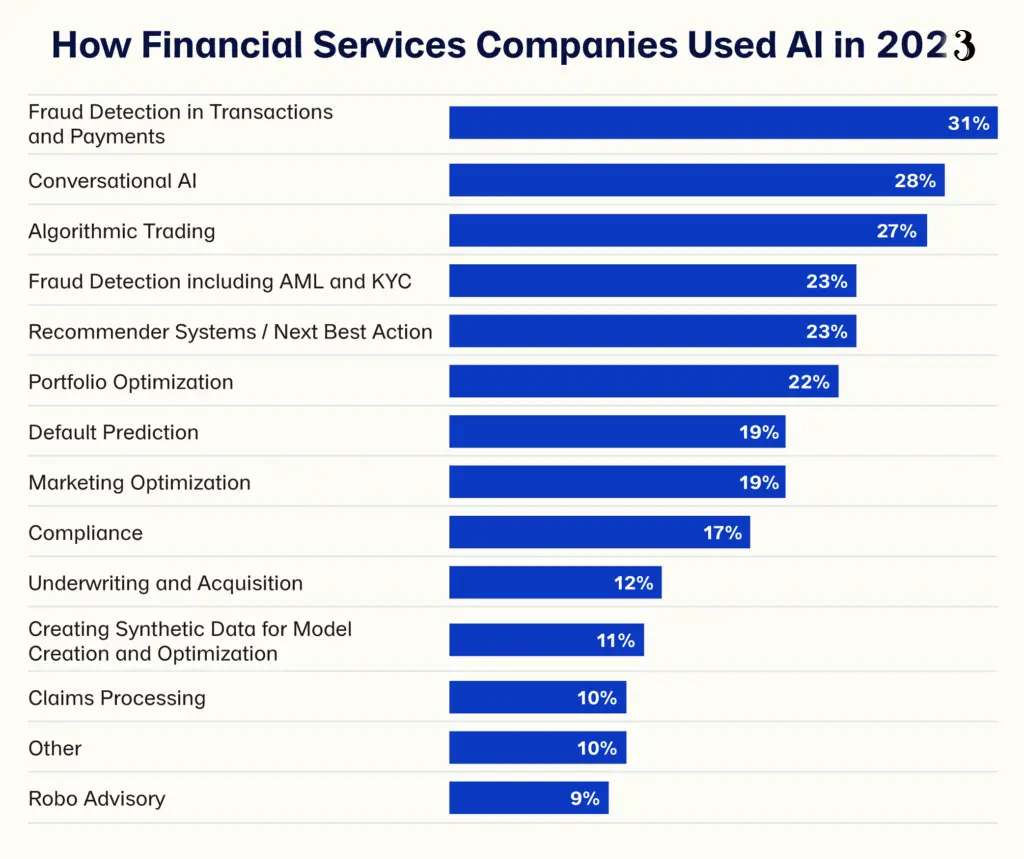AI In Finance – A Phenomenal Change In Fintech Industry


The landscape of AI in finance is reshaping how we transact and spend money across borders or worldwide. The financial industry is highly risky and challenging to operate among other sectors. Financial institutions are closely related to people’s wealth, whether they use it to save money, roll it by putting it into investment, or simplify large business transactions.
Whatever the reason, people unquestioningly trust renowned financial institutions as well as give their money to save it for the future. To keep their promises as trusted financial institutions, financial institutions take help with futuristic technology, including blockchain, AI and ML, cloud-based platforms, etc.
AI captivates the attention of financial and banking industries to secure data, easy cash flows, improve customer support, automate routine processes, and, most importantly, data processing.
Moreover, in the context of financial institutions, data stands as the most vulnerable element requiring robust safeguarding. In this blog, we will describe the optimal use of AI in Finance operations to secure customer data and wealth.
The Evolution Of AI In Finance
The gradual increase of AI in finance operations established a new shift from legacy systems to advanced financial management solutions. Let’s discover one by one!

Automation and efficiency
Initially, AI in finance automates the tedious tasks that ultimately save time and resources and cut costs. These repeated tasks are now totally handed over to AI, including data entry, transactions, and handling ordinary customer queries. As a result, the financial industry has observed a phenomenal change in accuracy and low human error, which is fascinating.
Predictive Analysis
One of the major milestones of AI in the finance industry is the successful implementation of predictive analysis. It helps the financial industry to allocate risk factors and make data-driven decisions before something wrong happens. Implementing AI’s predictive model in finance mobile applications or ERP solutions helps detect fraudulent activities, suggest investment recommendations, identify improvement areas, or assess risk.
Personalization
After further advancement in AI, the amplification of personalization brought improved customer experience. From implementing chatbots on different channels to providing recommendations, everything is sorted out automatically. In fact, now the financial industry believes that the more personalization interaction you create, the more you can enhance your business revenue.
Advanced Analytics
As AI technology advanced, it could handle complex tasks, such as natural language processing (NLP) for sentiment analysis and algorithmic trading. This ushered in a new era of algorithmic trading strategies. The personalized data-driven judgment delivers accuracy with the help of the fastest-growing Machine Learning.
Regulatory Compliance
AI was adopted for regulatory compliance, helping financial institutions adhere to stringent rules and regulations, such as Know Your Customer (KYC) and Anti-Money Laundering (AML) requirements.
Application Of AI In Finance Sector
The application of AI in finance drastically changes the way it operates. AI will keep your ecosystem fast and reliable, from digital payment to secure payment gateways.
Algorithmic Trading
AI has revolutionized trading by leveraging sophisticated algorithms to analyze market data, news, and historical trends. These algorithms also execute trades at optimal times, maximizing profits and minimizing risks. They can respond to market fluctuations within fractions of a second, a feat impossible for human traders.
Risk Assessment and Management
AI models have transformed risk assessment by analyzing vast datasets to evaluate creditworthiness and identify potential risks. Lenders now use AI-driven credit scoring to make lending decisions with unparalleled accuracy. In fact, AI in finance has led to more inclusive lending practices and reduced default rates.
Fraud Detection and Prevention
Financial institutions employ AI to detect unusual patterns and anomalies in transaction data. These anomalies, often indicative of fraudulent activities, are flagged in real time, allowing swift intervention to prevent financial losses. To summarize, AI in finance has the ability to recognize emerging threats and adapt to evolving fraud tactics, which is crucial in safeguarding financial assets.
Customer Service and Engagement
AI-driven chatbots and virtual assistants provide immediate and personalized customer support. They use natural language processing to understand and respond to customer queries, offer product recommendations, and assist with account-related tasks. In addition, the non-stop 24/7 availability and real-time responses enhance customer satisfaction and retention.
Portfolio Management and Robo-Advisors
Robo-advisors, powered by AI, have democratized investment management. These systems create and manage investment portfolios based on individual preferences, risk tolerance, and financial goals. Investors, even those with limited financial knowledge, can also access sophisticated investment strategies that were once the domain of wealth management firms.
Regulatory Compliance and Reporting
AI in finance simplifies the complex task of regulatory compliance. It also automates data collection, reporting, and auditing processes, ensuring financial institutions adhere to strict regulatory requirements. Certainly, it saves time and resources and mitigates the risk of non-compliance penalties.
How AI in Finance Benefits The Financial Industry
Enhanced Efficiency
Automation of routine tasks significantly improves operational efficiency. Employees are liberated from tedious tasks, allowing them to focus on more strategic and value-added activities. As a result, it boosts overall productivity, increases accuracy, and reduces operational costs.
Read more: IoT Devices in Banking and Finance – 5 Use Cases You did not Know About
Improved Decision-Making
AI’s data analysis capabilities provide actionable insights, enabling financial professionals to make more informed and timely decisions. With the help of AI in finance, the implementation of data-driven strategies is now possible. In fact, with access to real-time data and predictive analytics, institutions can optimize resource allocation, identify growth opportunities, and manage risk effectively.
Reduced Fraud
AI-powered fraud detection algorithms identify suspicious activities in real time, minimizing financial losses due to fraudulent transactions. The ability to detect complex fraud patterns makes AI invaluable in safeguarding assets and preserving trust.
Cost Reduction
Automation of processes reduces operational costs, leading to improved profit margins for financial institutions. By streamlining workflows as well as minimizing errors, AI lowers business costs and enhances competitiveness.
Personalized Services
Customers now enjoy personalized financial recommendations and services tailored to their unique needs as well as their preferences. This personalization enhances customer satisfaction, strengthens customer relationships, and ultimately drives business growth.
Risk Mitigation
Advanced risk assessment models powered by AI help financial institutions make more informed lending and investment decisions. By reducing the likelihood of high-risk investments and loan defaults, AI contributes to long-term financial stability.
The More Advanced Version of AI in Finance
Although we have taken strides over a more advanced version of AI to create an encrypted financial system, there is more to go! At MMC Global, we have completed AI-based financial web app and mobile app development that drastically helps businesses improve their operation. In fact, our specialized AI engineers and mobile app developers infuse the ideations into reality with their polished skills and capabilities.
Furthermore, we are ready to go deeper into the AI landscape and build more optimized and upgraded systems that ensure security and are based on the latest technology trends. The trajectory of AI in finance points towards a future filled with promise and innovation:
Greater Integration
AI will become even more deeply ingrained in financial processes, evolving from a supplementary tool to an indispensable industry component. It will be integrated into core operations, shaping the future of finance.
Advanced Customer Insights
AI will continue to refine its ability to extract meaningful insights from customer data. In fact, Financial institutions will harness these insights to deliver hyper-personalized services, further enhancing customer engagement and satisfaction.
Quantum Computing
The advent of quantum computing will open up new horizons for AI in finance. These ultra-powerful computers will enable faster and more complex computations, revolutionizing risk modeling, portfolio optimization, and cryptography tasks.
Conclusion
In conclusion, introducing AI into the finance sector has led to an unprecedented era of transformation. AI has revolutionized the Fintech industry in every dimension, from automating routine tasks to enhancing decision-making, reducing fraud, and offering personalized services. As AI technology evolves and matures, its influence on finance will only intensify. Financial institutions that embrace AI technologies are not only staying competitive but are also poised to thrive in this ever-evolving landscape. The future of finance is undeniably intertwined with the growth and integration of Artificial Intelligence.



